Razieh Saremi
From Zero to The Hero: A Collaborative Market Aware Recommendation System for Crowd Workers
Jul 06, 2021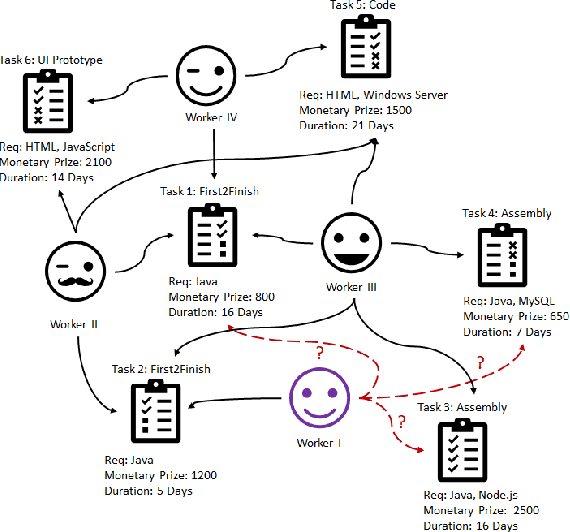
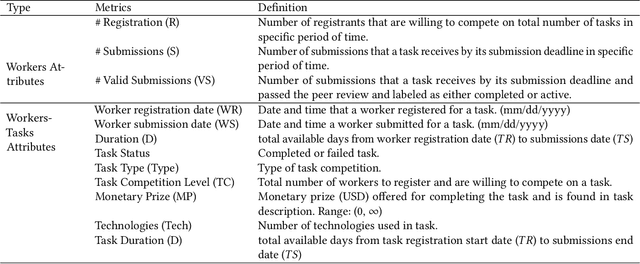
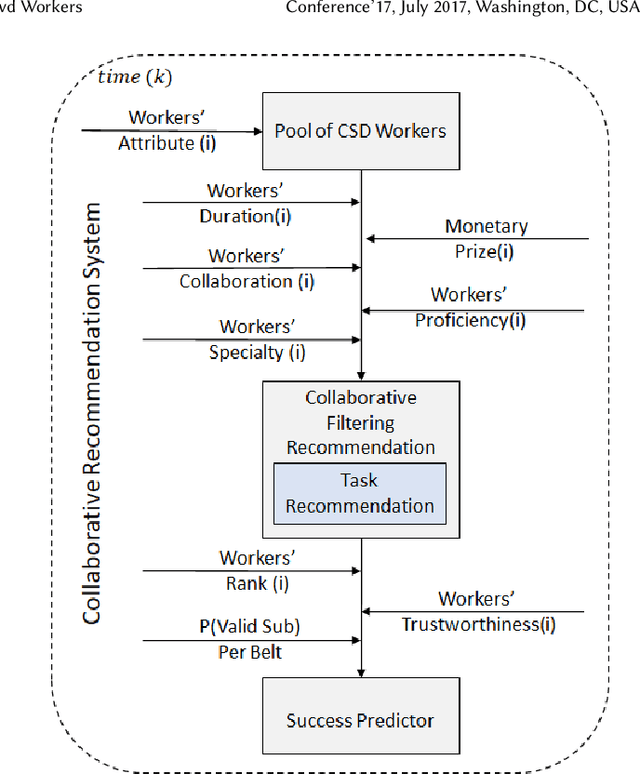
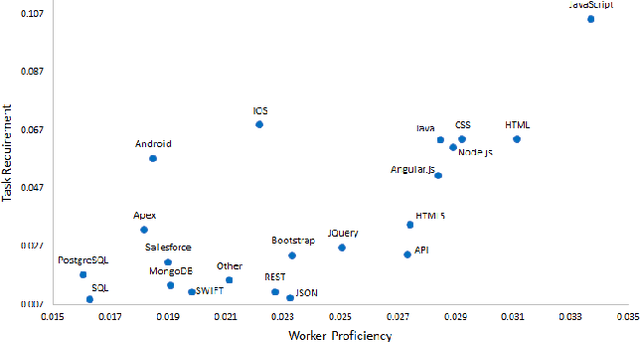
Abstract:The success of software crowdsourcing depends on active and trustworthy pool of worker supply. The uncertainty of crowd workers' behaviors makes it challenging to predict workers' success and plan accordingly. In a competitive crowdsourcing marketplace, competition for success over shared tasks adds another layer of uncertainty in crowd workers' decision-making process. Preliminary analysis on software worker behaviors reveals an alarming task dropping rate of 82.9%. These factors lead to the need for an automated recommendation system for CSD workers to improve the visibility and predictability of their success in the competition. To that end, this paper proposes a collaborative recommendation system for crowd workers. The proposed recommendation system method uses five input metrics based on workers' collaboration history in the pool, workers' preferences in taking tasks in terms of monetary prize and duration, workers' specialty, and workers' proficiency. The proposed method then recommends the most suitable tasks for a worker to compete on based on workers' probability of success in the task. Experimental results on 260 active crowd workers demonstrate that just following the top three success probabilities of task recommendations, workers can achieve success up to 86%
An Evolutionary Algorithm for Task Scheduling in Crowdsourced Software Development
Jul 05, 2021
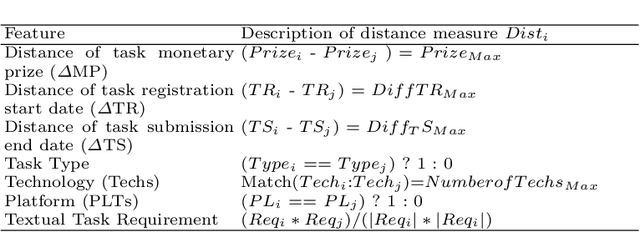
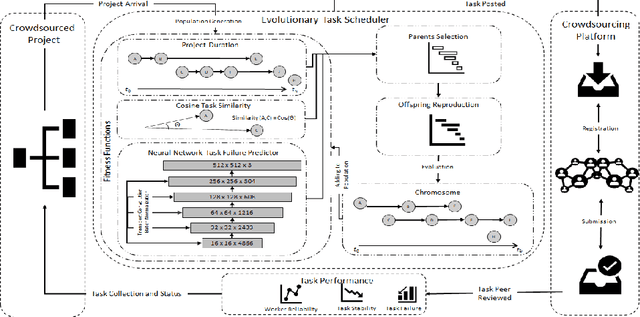
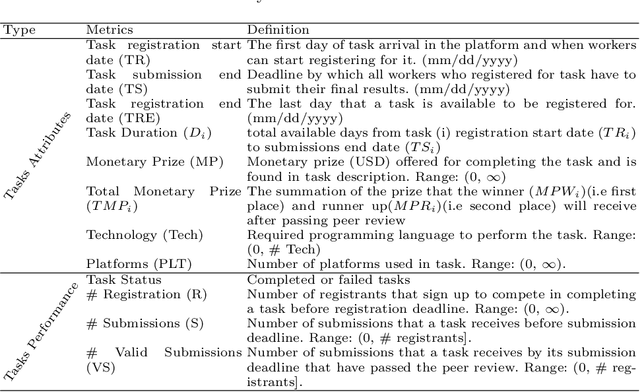
Abstract:The complexity of software tasks and the uncertainty of crowd developer behaviors make it challenging to plan crowdsourced software development (CSD) projects. In a competitive crowdsourcing marketplace, competition for shared worker resources from multiple simultaneously open tasks adds another layer of uncertainty to the potential outcomes of software crowdsourcing. These factors lead to the need for supporting CSD managers with automated scheduling to improve the visibility and predictability of crowdsourcing processes and outcomes. To that end, this paper proposes an evolutionary algorithm-based task scheduling method for crowdsourced software development. The proposed evolutionary scheduling method uses a multiobjective genetic algorithm to recommend an optimal task start date. The method uses three fitness functions, based on project duration, task similarity, and task failure prediction, respectively. The task failure fitness function uses a neural network to predict the probability of task failure with respect to a specific task start date. The proposed method then recommends the best tasks start dates for the project as a whole and each individual task so as to achieve the lowest project failure ratio. Experimental results on 4 projects demonstrate that the proposed method has the potential to reduce project duration by a factor of 33-78%.
Study on Patterns and Effect of Task Diversity in Software Crowdsourcing
May 29, 2020
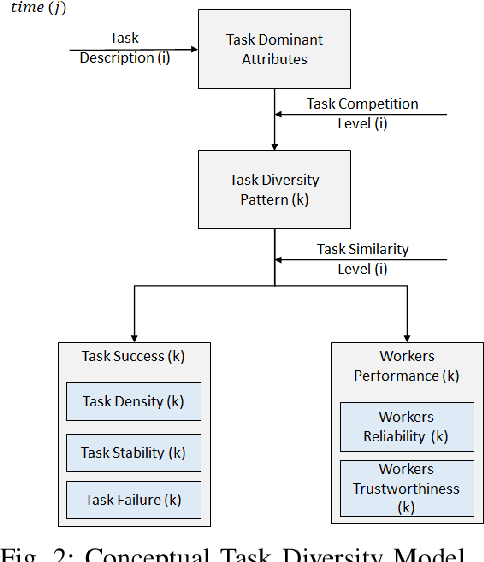
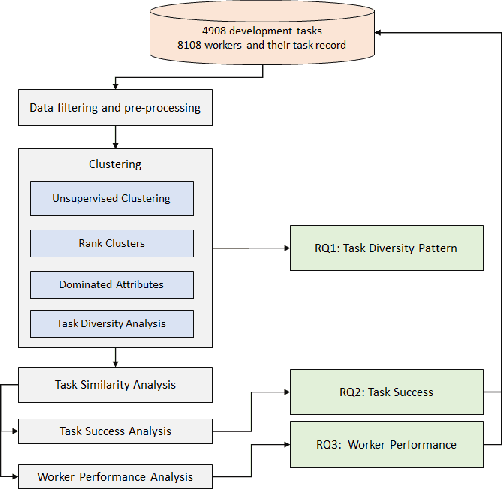
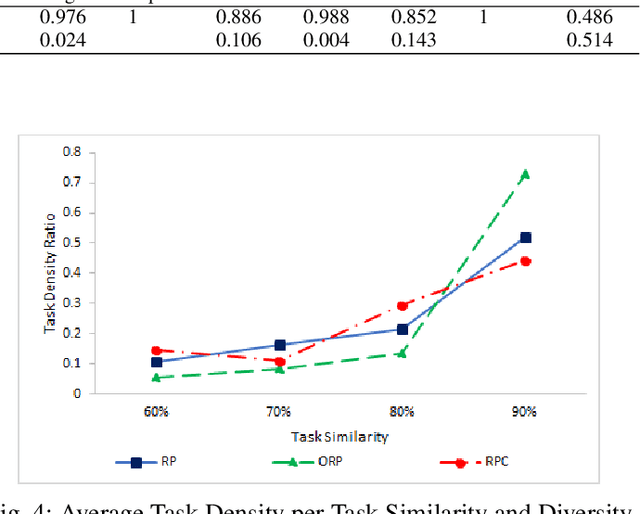
Abstract:Context: The success of software crowdsourcing depends on steady tasks supply and active worker pool. Existing analysis reveals an average task failure ratio of 15.7% in software crowdsourcing market. Goal: The objective of this study is to empirically investigate patterns and effect of task diversity in software crowdsourcing platform in order to improve the success and efficiency of software crowdsourcing. Method: We propose a conceptual task diversity model, and develop an approach to measuring and analyzing task diversity.More specifically, this includes grouping similar tasks, ranking them based on their competition level and identifying the dominant attributes that distinguish among these levels, and then studying the impact of task diversity on task success and worker performance in crowdsourcing platform. The empirical study is conducted on more than one year's real-world data from TopCoder, the leading software crowdsourcing platform. Results: We identified that monetary prize and task complexity are the dominant attributes that differentiate among different competition levels. Based on these dominant attributes, we found three task diversity patterns (configurations) from workers behavior perspective: responsive to prize, responsive to prize and complexity and over responsive to prize. This study supports that1) responsive to prize configuration provides highest level of task density and workers' reliability in a platform; 2) responsive to prize and complexity configuration leads to attracting high level of trustworthy workers; 3) over responsive to prize configuration results in highest task stability and the lowest failure ratio in the platform for not high similar tasks.
 Add to Chrome
Add to Chrome Add to Firefox
Add to Firefox Add to Edge
Add to Edge